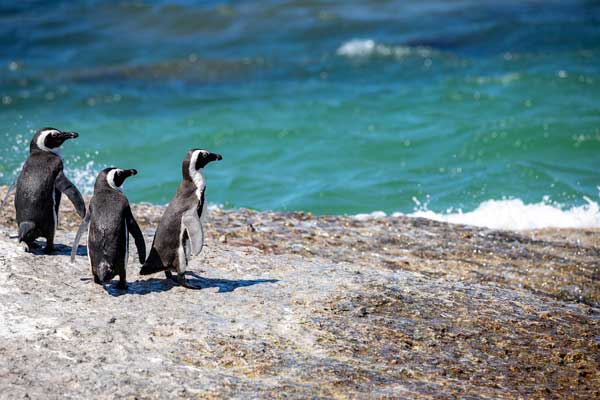Rapid melting of sea ice threatens Adélie penguins' survival

[Three penguins standing on a rock. Photo Credit to Pixabay]
Recent studies revealed that the rapid melting of sea ice due to climate change is severely affecting Adélie penguins, disrupting their critical molting period and long-distance migrations, and ultimately threatening their survival.
This research demonstrates how the Adélie penguins are struggling to maintain their regular lifestyles in the face of these challenges.
One of the most important parts of their lifestyle is migration due to their adaptation to better environments.
Traditionally, Adélie penguins have relied on sea ice for their long-distance expeditions, but climate change is forcing them to reconsider these migrations for the first time in history.
The rising issue of climate change has been a significant and attention-grabbing matter all across the globe for several decades.
While many organizations, programs, and individuals are working to alleviate the problem, its consequences are unmistakable.
Hundreds of species living in different habitats, lifestyles, and environments are all being affected by this crisis.
One of these are the adèlie penguin species—also known as Pygoscelis adeliae, they are a species of penguin found along the entire coast of Antarctica.
Adélie penguins play a crucial role in the Antarctic food chain, preying on krill and small fish, and serving as prey for larger predators such as leopard seals and killer whales.
These smaller creatures are often found under sea ice, which is rapidly melting due to global warming.
According to the organization The World Counts, “A whopping 750 billion tons of ice is melting every year due to global warming.”
This dramatic loss of ice is depriving thousands of sea animals of their homes and pathways, including Adélie penguins’ migration routes.
The loss of ice also affects the food chain, as krill and other small creatures lose their habitats, leading to a decline in the Adélie penguins’ primary food sources.
Moreover, the changing temperatures disrupt the penguins’ egg hatching season, with warmer weather causing eggs to hatch prematurely, threatening the survival of their offspring.
The impact of climate change on the Adélie penguins have severely and negatively interfered with their population size.
This is demonstrated in the article “Dramatic Decline in Adélie Penguins Near Mawson” by the Australian Antarctic Program, which states that there has been a 43% decrease in the Adélie penguin population along the East Antarctica coast.
This extensive drop brings the concern about how the Antarctica food chain will be affected due to climate change.
The Adélie penguin’s crucial role to the food chain makes it easy for the ecosystem to be disrupted by its fluctuation in population.
The drop in their numbers could be the start of a large disruption with the environment and its animals.
Though Antarctica is far and often overlooked by those on the opposite side of the globe, the changes that are facing could be detrimental and create issues climbing up to human populations.
Changes in the Antarctic ecosystem, particularly in its waters that cover 70% of the Earth, could significantly affect life on human-inhabited lands and the animals that occupy it.
This rising issue emphasizes the need to raise awareness about the consequences of human actions on species living in remote parts of the world.

- Yubin Kim / Grade 11 Session 5
- Branham High School

![THE HERALD STUDENT REPORTERS [US]](/assets/images/logo_student_us.png)
![THE HERALD STUDENT REPORTERS [Canada]](/assets/images/logo_student_ca.png)
